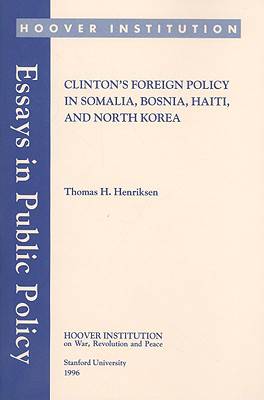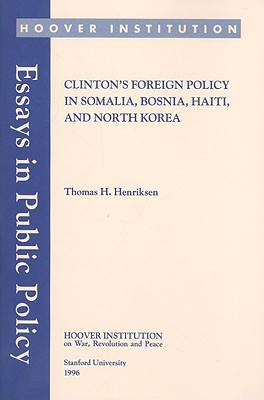
- Retrait gratuit dans votre magasin Club
- 7.000.000 titres dans notre catalogue
- Payer en toute sécurité
- Toujours un magasin près de chez vous
- Retrait gratuit dans votre magasin Club
- 7.000.000 titres dans notre catalogue
- Payer en toute sécurité
- Toujours un magasin près de chez vous
Clinton's Foreign Policy in Somalia, Bosnia, Haiti, and North Korea
Thomas H HenriksenDescription
Half a decade has elapsed since the collapse of the Soviet Union, and nearly four years have passed since Bill Clinton became president of the United States. These two events, nearly stimultaneous in occurrence, present a fitting time for an assessment of specific international policy decisions made by the White House. This juncture is particularly appropriate for an evaluation of President Clinton's handling of prominent foreign polcy crises as he seeks a second term.
The Clinton administration has dealt with four high-profile problems--Somalia, Bosnia, Haiti, and North Korea--which demanded presidential attention, resulted in the deployment of U.S. military forces, and generated congressional and public controversy. All were small-scale operations when compared with U.S. involvement in major twentieth-century conflicts. Yet they are significant because the way they were handled may determine the way future large-scale emergencies are managed.
The Clinton administration displayed hesitation, vacillation, and ambivalence in addressing turmoil in Somalia, Bosnia, and Haiti, which carried international ramifications. Somalia emerges as a defining foreign policy decision for the Clinton administration. After suffering a setback in Somalia, the White House moved overcautiously and abdicated leadership in the Bosnian crisis. When Clinton intervened in Bosnia and Haiti, he first narrowed the operational scope, set rigid timetables, put undue restrictions on the missions, and finally emphasized exit strategies. The results of these American efforts, therefore, are likely to be transitory. In the case of North Korea, the White House has been correct to engage the decrepit but dangerous North Korean regime, but the administration's nuclear agreement is difficult to verify and has secured inadequate quid pro quos in return for American, Japanese, and South Korean inducements for cooperation. Most important, the Geneva Agreement set a bad international precedent in the fight against nuclear proliferation.
Whoever wins the national election and takes office as president must reassert America's moral and strategic leadership to bolster U.S. credibility in a world undergoing profound change. The next president must articulate with clarity and conviction for Congress and the public the importance of America's international responsibilities that accompany its power and influence. Among the specific recommendations for the incoming administration in 1997 are the eastward enlargement of the North Atlantic Treaty Organization, the construction of a missile defense system, and an increase in military spending to meet future crises, which are almost certain to be greater challenges than Somalia, Bosnia, Haiti, or North Korea.
Spécifications
Parties prenantes
- Auteur(s) :
- Editeur:
Contenu
- Nombre de pages :
- 44
- Langue:
- Anglais
- Collection :
- Tome:
- n° 72
Caractéristiques
- EAN:
- 9780817957728
- Date de parution :
- 01-10-96
- Format:
- Livre broché
- Format numérique:
- Trade paperback (VS)
- Dimensions :
- 147 mm x 221 mm
- Poids :
- 90 g







